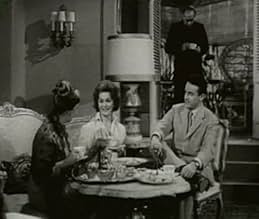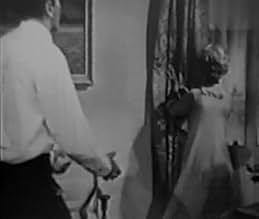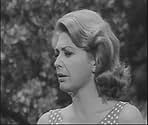Aggiungi una trama nella tua linguaA collection of tales about paranormal events, horrifying folklore, and the world of the unknown.A collection of tales about paranormal events, horrifying folklore, and the world of the unknown.A collection of tales about paranormal events, horrifying folklore, and the world of the unknown.
Sfoglia gli episodi
Recensioni in evidenza
I do not understand the debate about the Twilight Zone and One Step Beyond. Both were excellent in their own rights. If both were on at the same time, I would watch one and tape the other. True horror fans of the anthology shows would see that these are two entirely different beasts. OSB is fictionalized accounts of supposedly true events. The creepiest One Step Beyond episode that I ever saw involved some German young people who were into gliders before WWII. One gets jealous and kills one who kissed his girlfriend before taking off in the glider. He stabs him and the glider disappears. The made a pact before hand to meet back after the war.Lo and behold the glider returns on that day with the survivors there. That was creepy!The horror wasn't really shown on screen which is a testament to the writing and creativity of the stories and the show. I just wish I could find old episodes to buy or rent. The show was just that good.
I was born five years before Alcoa produced this wonderful series - and it is wonderful, even though I remain thoroughly skeptical about the "truth" of the stories that were presented. Hosted by John Newland, in a quiet, thoughtful, and urbane manner, it presented different types of occult phenomenon each week, in well produced half-hour shows. I did not see it until the 1960s, when it was in syndication as reruns. But it was certainly entertaining and creepy. I won't dare to rate it against THE TWILIGHT ZONE or THE OUTER LIMITS (in particular as they were outwardly fictional and frequently entered science fiction), but it was one of the top horror shows in television history.
Newland would come out with his weekly introduction - just like Rod Sterling or Alfred Hitchcock on their shows. Sometimes he would bring a small prop or item related to the story. On one show he brings out an old watch, which he will look at several times in the half hour, telling the time on it. He says to the audience, when he first looks at it, "J.W.B. Those are the initials of the owner of this watch. They are the initials of a murderer." The episode that follows deals with the assassination of Abraham Lincoln (the watch being John Wilkes Booth's). It is not a simple retelling of the story of Lincoln's death. The episode describes the odd premonitions and signs that reportedly happened in Washington, D.C. on that date, and around the country. For example, Lincoln's relating several eerie dreams he had (one of which was of him in the East Room, being told that the visitors there were in mourning for the President - who had been assassinated).
There were many odd stories. In one Donald Pleasance was a successful barrister, about to become a high court justice in Great Britain, when he is confronted by evidence that only he can understand that shows how he allowed an innocent man to be hanged years earlier at the start of his career (he was the prosecutor). Supposedly the truth was told to him by the so-called murdered woman (apparently not so murdered as she was supposed), but he never reported it to the authorities. Twenty years later and evidence that he destroyed reappears, forcing him to confess - and driving him insane in the end (he becomes a madman addressing the crowds in Hyde Park daily relating his evil act).
An episode with Patrick Macnee about premonitions regarding the sinking of the Titanic ends with a reference which I can vouch for is true - that in 1898 Mr. Morgan Robinson wrote a novella, FUTILITY: THE WRECK OF THE TITAN, about the world's greatest ocean liner being sunk by an iceberg on it's maiden voyage with great loss of life. Another episode with Werner Klemperer dealt with an unrepentant Nazi, pursued by some malevolent spirit on a U-boat, who causes so much noise that the U-boat is forced to surrender to an allied naval craft or be blown out of the water. There was one curious episode about an evil aristocrat's diamond choker that picked up the vibes from her personality, and choked her to death (and later killed her maid who stole the choker as well). Elizabeth Montgomery played a young flirt on an old west cavalry post, who thoughtlessly forces a young officer to do a dangerous assignment that kills him, and yet, weeks later when the post has a regimental ball, is confronted before everyone by his ghost who dances with her until she dies.
So it went on these episodes. Even if, like myself, you did not believe in the phenomenon that Newland's stories presented (and he never forced anyone to believe them) you got into the mood and watched some interesting stories, and some first rate acting (William Shatner, Charles Bronson, and Edward Binns were three other actors who appeared on the show). For a really spooky, but enjoyable experience, ONE STEP BEYOND was very hard to beat.
Newland would come out with his weekly introduction - just like Rod Sterling or Alfred Hitchcock on their shows. Sometimes he would bring a small prop or item related to the story. On one show he brings out an old watch, which he will look at several times in the half hour, telling the time on it. He says to the audience, when he first looks at it, "J.W.B. Those are the initials of the owner of this watch. They are the initials of a murderer." The episode that follows deals with the assassination of Abraham Lincoln (the watch being John Wilkes Booth's). It is not a simple retelling of the story of Lincoln's death. The episode describes the odd premonitions and signs that reportedly happened in Washington, D.C. on that date, and around the country. For example, Lincoln's relating several eerie dreams he had (one of which was of him in the East Room, being told that the visitors there were in mourning for the President - who had been assassinated).
There were many odd stories. In one Donald Pleasance was a successful barrister, about to become a high court justice in Great Britain, when he is confronted by evidence that only he can understand that shows how he allowed an innocent man to be hanged years earlier at the start of his career (he was the prosecutor). Supposedly the truth was told to him by the so-called murdered woman (apparently not so murdered as she was supposed), but he never reported it to the authorities. Twenty years later and evidence that he destroyed reappears, forcing him to confess - and driving him insane in the end (he becomes a madman addressing the crowds in Hyde Park daily relating his evil act).
An episode with Patrick Macnee about premonitions regarding the sinking of the Titanic ends with a reference which I can vouch for is true - that in 1898 Mr. Morgan Robinson wrote a novella, FUTILITY: THE WRECK OF THE TITAN, about the world's greatest ocean liner being sunk by an iceberg on it's maiden voyage with great loss of life. Another episode with Werner Klemperer dealt with an unrepentant Nazi, pursued by some malevolent spirit on a U-boat, who causes so much noise that the U-boat is forced to surrender to an allied naval craft or be blown out of the water. There was one curious episode about an evil aristocrat's diamond choker that picked up the vibes from her personality, and choked her to death (and later killed her maid who stole the choker as well). Elizabeth Montgomery played a young flirt on an old west cavalry post, who thoughtlessly forces a young officer to do a dangerous assignment that kills him, and yet, weeks later when the post has a regimental ball, is confronted before everyone by his ghost who dances with her until she dies.
So it went on these episodes. Even if, like myself, you did not believe in the phenomenon that Newland's stories presented (and he never forced anyone to believe them) you got into the mood and watched some interesting stories, and some first rate acting (William Shatner, Charles Bronson, and Edward Binns were three other actors who appeared on the show). For a really spooky, but enjoyable experience, ONE STEP BEYOND was very hard to beat.
This is a show that never gets the respect or attention of its' better known relatives, "The Twilight Zone" and "The Outer Limits".
The show has a simpler format than the above mentioned series but is, or as a result of, able to maintain an air of "hey it could happen" throughout each episode.
Most of the performances are well done by the various actors, with only some being ham fisted.
Newland's performance as the convert host also enhances the production as does the haunting music.
The show has a simpler format than the above mentioned series but is, or as a result of, able to maintain an air of "hey it could happen" throughout each episode.
Most of the performances are well done by the various actors, with only some being ham fisted.
Newland's performance as the convert host also enhances the production as does the haunting music.
This is a very worthy program that deserves revival, (preferably on DVD from 35 mm stock or original negatives). Comparisons with "The Twilight Zone" are really not terribly helpful inasmuch as they each have separate entertainment objectives.
"One Step Beyond" purports to dramatize actual psychic experiences. In this sense, its writers would have been working to depict (allegedly anyhow) first hand experiences with ESP etc.
Irrespective of the truth of this, the show possesses a very singular, outre quality, quite unlike "TZ". Anyone seriously interested (academically or otherwise) in the paranormal would likely find this show of interest.
A great deal of the oppressive mood of the episodes can be credited to Mr. Lubin's music, (some of which was released on LP--this is definately a record you should seek out)most especially the title theme.
Mr. Newland made for an urbane and elegantly clad host, whose nebulous persona fit the mood of the episodes snugly. Not only was he personally interested in the paranormal, but he had a long stage, TV and film career already underway by 1959. Amongst other things, he was frequently featured on the excellent, "Loretta Young Show," and directed a film starring John Beale as a heart attack victim, (sorry the title escapes me at the moment).
At all events, "Alcoa Presents One Step Beyond" merits reappraisal.
"One Step Beyond" purports to dramatize actual psychic experiences. In this sense, its writers would have been working to depict (allegedly anyhow) first hand experiences with ESP etc.
Irrespective of the truth of this, the show possesses a very singular, outre quality, quite unlike "TZ". Anyone seriously interested (academically or otherwise) in the paranormal would likely find this show of interest.
A great deal of the oppressive mood of the episodes can be credited to Mr. Lubin's music, (some of which was released on LP--this is definately a record you should seek out)most especially the title theme.
Mr. Newland made for an urbane and elegantly clad host, whose nebulous persona fit the mood of the episodes snugly. Not only was he personally interested in the paranormal, but he had a long stage, TV and film career already underway by 1959. Amongst other things, he was frequently featured on the excellent, "Loretta Young Show," and directed a film starring John Beale as a heart attack victim, (sorry the title escapes me at the moment).
At all events, "Alcoa Presents One Step Beyond" merits reappraisal.
One commenter offered the proposition that "The Twilight Zone" was not a very good show and "One Step Beyond" was much better. There is truth to the latter statement. Step was a truly wonderful show, and I might add, MUCH freakier and scarier to a little kid. "The Burning Girl" episode killed me. And the one they did about the San Francisco earthquake was awesome. Suffice it to say that I spent a few nights awake wondering about this stuff. Unlike the Twilight Zone, Step featured stories that were somewhat based in fact, or at least believable to people who believe. But I have to take the original poster to task. He made it sound as if Twilight Zone sucked. I can assure you, it did not.
These shows aired when television was still in it's infancy. As was the writing, the directing, the acting and all that goes with it. In both cases, there were experiments. Nobody knew how it would turn out. But one thing is certain. BOTH shows helped to create the sci-fi dramas we accept as so commonplace today. There was NOTHING commonplace about the "Willoughby" episode of the Twilight Zone. Nor was there anything commonplace about the Burning Girl episode of One Step Beyond. They were both wonderful shows that broke ground for the future. That being said, when are the One Step Beyond episodes coming back for viewing? I sure miss them.
These shows aired when television was still in it's infancy. As was the writing, the directing, the acting and all that goes with it. In both cases, there were experiments. Nobody knew how it would turn out. But one thing is certain. BOTH shows helped to create the sci-fi dramas we accept as so commonplace today. There was NOTHING commonplace about the "Willoughby" episode of the Twilight Zone. Nor was there anything commonplace about the Burning Girl episode of One Step Beyond. They were both wonderful shows that broke ground for the future. That being said, when are the One Step Beyond episodes coming back for viewing? I sure miss them.
Lo sapevi?
- QuizThrough an oversight, Worldvision didn't renew the copyrights on most episodes of this series when they expired in the late 1980s, and they thus fell into the public domain. Since royalties didn't have to be paid to Worldvision, the result was a revival of the series on UHF and cable television and on VHS and DVD. Since well-worn syndication prints were and are typically used by those media, the results often leave something to be desired, quality-wise. Despite the public domain status for most episodes, the series' remaining copyrights belongs to its distributor CBS Television Distribution. CTD is the successor to the series' previous distributors, which include ABC Films successor Worldvision Enterprises and CTD's predecessor Paramount Domestic Television.
- Citazioni
John Newland: [episode introduction] What you are about to see is a matter of human record. Explain it: we cannot. Disprove it: we cannot. We simply invite you to explore with us the amazing world of the Unknown... to take that One Step... Beyond.
- Versioni alternativeWhen this was run on network television (ABC), it was titled "Alcoa Presents: One Step Beyond." The 16mm television syndication prints carry the title of simply "One Step Beyond."
- ConnessioniFeatured in Television: The First Fifty Years (1999)
I più visti
Accedi per valutare e creare un elenco di titoli salvati per ottenere consigli personalizzati
- How many seasons does One Step Beyond have?Powered by Alexa
Dettagli
- Tempo di esecuzione25 minuti
- Colore
- Proporzioni
- 1.33 : 1
Contribuisci a questa pagina
Suggerisci una modifica o aggiungi i contenuti mancanti

Divario superiore
By what name was One Step Beyond (1959) officially released in India in English?
Rispondi





































